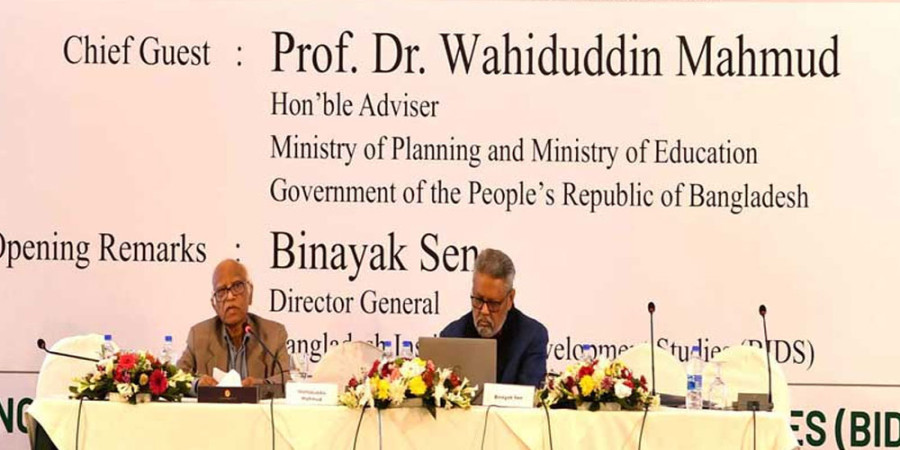
ছবি: Education and Planning Advisor Wahiduddin Mahmud speaks at the inaugural session of the four-day seminar organized by the Bangladesh Institute of Development Studies (BIDS). Photo: Collected
Interim Education and Planning Advisor Wahiduddin Mahmud has expressed optimism that a politically elected government might take office next year. However, he clarified, "This is purely my personal opinion; I don't know what will actually happen."
Mahmud shared this perspective during the inaugural session of a four-day seminar organized by the Bangladesh Institute of Development Studies (BIDS) on Saturday at a hotel in Gulshan, Dhaka. Responding to a question from businessman Tanvir Mohammad Dipu about whether a "poor country" like Bangladesh could become a "rich country" without the support of nations like Canada, the United States, Australia, Japan, and Saudi Arabia, Mahmud pointed to the potential of collective action once an elected government is in place.
"After an elected government assumes power, everyone can work together and think collectively about how to achieve these goals," he remarked.
Addressing Inequality Through Quality Education
Mahmud identified economic inequality as one of the pressing concerns for the country. He emphasized the need for quality education to bridge this gap, pointing out that Bangladesh remains far from achieving this goal. "Reducing inequality requires significant investments in quality education, which is a long-term but necessary effort," he said.
Balancing Development and Prestige Projects
Reflecting on the previous government's initiatives, Mahmud acknowledged that while some projects, such as the Padma Bridge, were beneficial, many were undertaken for prestige rather than necessity. "Several projects implemented in recent years fall under the category of 'prestige projects,' aimed more at achieving fame than addressing the country's needs," he explained. "We are now contemplating how best to manage and utilize these projects."
Challenges in Building an Equitable Society
Mahmud highlighted the challenges facing the interim government, particularly the scarcity of resources. "The interim government is operating with significant resource constraints," he said, adding that capital flight and banking sector irregularities have exacerbated the situation.
"Large sums of money have been siphoned abroad, and while people’s money remains in banks, the banks’ funds have gone elsewhere," Mahmud elaborated. He cited the financial struggles of large corporations like Beximco, which show assets on paper but lack liquidity within the country. "Workers need to be paid, but where will the money come from?" he questioned.
Given this reality, Mahmud acknowledged the difficulty of fostering an equitable society. "With limited resources, increasing investments in education, healthcare, and human capital development is challenging," he noted. He cited ethical dilemmas in resource allocation, such as whether to invest in dialysis machines or public health, as a recurring challenge for the government.
The Ethical Dilemma in Resource Allocation
Mahmud admitted that resolving such ethical conflicts is complex and may be beyond the scope of even renowned economists like Amartya Sen or John Rawls. "These ethical dilemmas—where resources should be allocated and which priorities should take precedence—are difficult to answer, even for the world's greatest thinkers," he observed.
Election Date Announcement Pending
Meanwhile, the Chief Advisor's Press Wing announced on November 24 that the date of the upcoming election will be disclosed by the Chief Advisor. The statement clarified that comments on the matter from other individuals reflect their personal opinions and do not represent official decisions.
Mahmud concluded by reiterating the need for collective effort and prudent policymaking to navigate the country's challenges and move toward a more equitable society. "Building a better future will require collaboration, thoughtful resource management, and a long-term vision," he stated.
repoter






